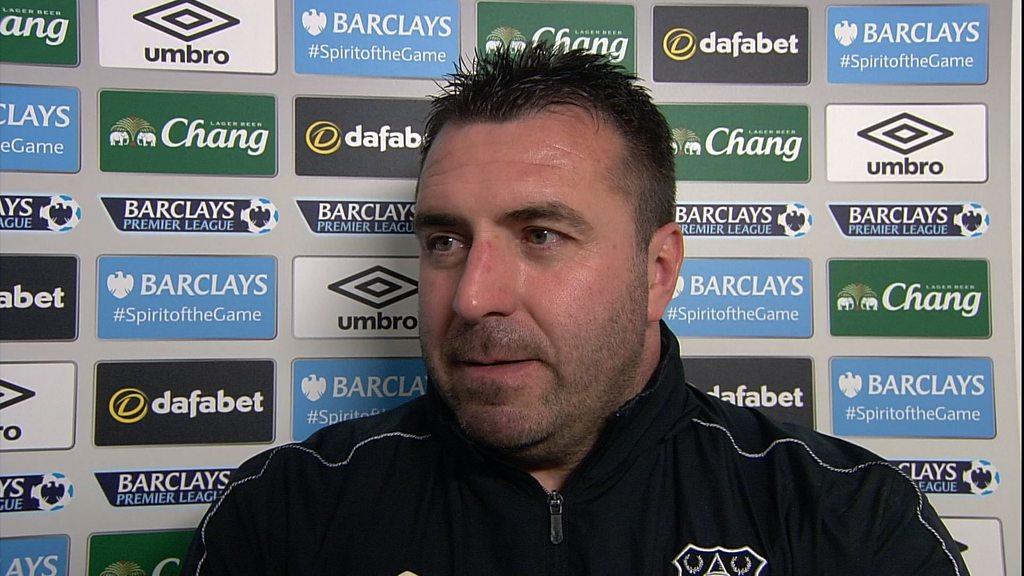England's Under-20 World Cup triumph points to bright future
- Published
- comments
Everton's Calvert-Lewin scores England winner in U20 World Cup final
England's Under-20 World Cup winners have been a revelation, sparking a fresh debate on youth development.
A 1-0 win over Venezuela in Sunday's final in South Korea gave England their biggest international title since 1966.
So can the nation dare to dream that some of these players could go on to help revive the full senior side, perhaps even in time to help the FA achieve its stated aim of a World Cup victory in 2022?
Having not won a single match in the U20 tournament since 1997 - and failed to even qualify on four occasions over the past 20 years - manager Paul Simpson's side have confounded the theory that English youngsters are not as technically proficient as their European or South American rivals.
Yet as well as pride and excitement, their success has also been met with scepticism about the inevitable talk of a new 'golden generation', and concern that this proves another false dawn.
What does bode well for the future is that this squad appears to have been the result of a long-term plan, testament to the FA's National Football Centre at St George's Park, and its adherence to the sometimes derided 'England DNA' philosophy, in which consistency of tactics through the various development teams - both male and female - is paramount.
The FA may not have anywhere near as much control over youth coaching at the clubs as their counterparts in Germany - the DFB - but their vision does at least set a template for coaches, and now has a tangible example of what can be achieved.
Certainly St George's Park has become familiar territory for the U20s, the core of which won the U17 Euros in 2014 under John Peacock, and then reached the semi-finals of the U19 Euros last year under Aidy Boothroyd.
The Staffordshire site's location and cost has not been without controversy. And after England's abject humiliation at the hands of Iceland at Euro 2016, a solution to a generation of under-achievement seemed further away than ever. Several coaches, meanwhile, have left to join club set-ups.
But five years after St George's Park opened, there are signs the FA's investment is paying dividends, and that it finally has players who can handle the pressure of tournament football.
Everton youngsters 'outstanding' - David Unsworth
"It is enormous what the FA have done" Simpson told BBC Sport before the final.
"We want to develop the players into a certain style of play. Everything you see from the top national teams, we want to recreate that.
"This is the first group to come right through that pathway. We have eight teams qualified for tournaments this summer, both men and women, that is an unprecedented summer for English football teams."
He pointed to the "massive financial investment" in the facilities at St George's Park, the support staff, and the tournaments they have put the players through.
"I have been working with the U16s and we put the players on a trip to Brazil so they could experience South American opposition, the travelling, different climates," he said.
"This U20 group, we sent to South Korea last year so they experienced playing with an eight-hour time difference, and the humidity and temperature."
He said the FA had been trying to get its players accumulating caps at youth level in a way that players from countries like Germany and Spain do.
"There has been a level of consistency for selection, and they are now battle-hardened for tournament football," he said.
"We are trying to get our players to that level where they have played in major tournaments, played in Uefa competitions."
Simpson is quick to highlight the role of the clubs too, not only for the work done at their academies where most of the players' development is conducted, but for what he sees as a refreshing new attitude when it comes to the release of players.
FA technical director Dan Ashworth appears to have improved relations with managers, with Everton boss Ronald Koeman for instance allowing five players to miss the last two weeks of the season to prepare for the U20 World Cup.
Brought in to raise youth development standards, the Premier League's Elite Player Performance Plan - or EPPP - has seen significant investment in club academies, but is contentious.
There are concerns that the replacement of the old tribunal system with a fixed-price compensation scheme has led to smaller clubs being short-changed, the stockpiling of young talent at the richest clubs, and even the closure of some lower-league academies.
However, the Premier League believes the success of the U20s also suggests the EPPP is working, five years after it was established.
Club league appearances 2016-17 season by England U20s | ||||
|---|---|---|---|---|
Player | Club | Apps | Starts | Minutes |
Dean Henderson | Grimsby Town (loan) | 7 | 7 | 630 |
Freddie Woodman | Kilmarnock (loan) | 14 | 14 | 1260 |
Jake Clarke-Salter | Bristol Rovers (loan) | 12 | 9 | 841 |
Callum Connolly | Wigan Athletic (loan) | 17 | 14 | 1302 |
Dael Fry | Rotherham (loan) | 10 | 10 | 900 |
Jonjoe Kenny | Everton | 1 | 0 | 12 |
Fikayo Tomori | Brighton (loan) | 9 | 2 | 390 |
Ezri Konsa Ngoyo | Charlton | 32 | 30 | 2547 |
Lewis Cook | Bournemouth | 6 | 4 | 431 |
Ovie Ejaria | Liverpool | 2 | 0 | 6 |
Ainsley Maitland-Niles | Arsenal | 1 | 0 | 1 |
Josh Onomah | Tottenham | 5 | 0 | 18 |
Adam Armstrong | Barnsley (loan) | 34 | 21 | 1922 |
Adam Armstrong | Newcastle | 2 | 0 | 27 |
Dominic Calvert-Lewin | Everton | 11 | 5 | 345 |
Harrison Chapman | Sheffield United (loan) | 12 | 0 | 280 |
Ademola Lookman | Charlton | 21 | 15 | 1426 |
Ademola Lookman | Everton (signed in January) | 8 | 3 | 290 |
But the clubs of course, can also be a problem.
With the Premier League's record broadcast rights deals making it easier than ever for them to buy the best overseas talent, and the financial imperative of staying in the top flight often dissuading managers from taking a longer-term view, the task of breaking into first teams has never been tougher.
A 2015 study found the percentage of club-trained players in Premier League squads had reached a new low, with just 11.7% graduated from their club's academy.
A report released by Uefa in January found that 62% of players in England's top tier were foreign — the highest in Europe.
Analysis by football365.com, external has revealed that 41 English players under the age of 22 played at least one Premier League game last season, totalling 16,532 minutes at an average of 403 minutes per player.
In France it was 98 players, with 79,062 minutes of action, at an average of 806 minutes per player. Four Premier League sides - Manchester City, Middlesbrough, Stoke and Sunderland - did not give a single game to an English player currently under the age of 22.
Despite the efforts of the FA's former chairman Greg Dyke, and calls for quotas in starting XIs, the Premier League has resisted pressure to further restrict foreign imports, sticking with the rule that eight places in 25-man squads must be 'home-grown players'.
While 16 members of the U20s played first-team football last season, half of them had to go on loan to do so, with some - like goalkeeper Freddie Woodman (on loan at Kilmarnock from Newcastle) and forward Adam Armstrong (on loan at Barnsley from Newcastle) - enjoying highly successful spells at their adopted clubs.
Woodman makes incredible save from Penaranda penalty
Midfielder Kieran Dowell - one of the most impressive performers in South Korea - made no senior league appearances for Everton but stayed at Goodison, captaining coach David Unsworth's academy team to the title in the inaugural Under-23 competition - dubbed 'Premier League 2'.
Some clubs - with Chelsea and their army of loanees the most obvious example - prefer to farm out their young players so they gain first-team experience.
They say the pressure of matchday crowds and the intensity of competition is better for development than the more sheltered environment of the Under-23 league. Others question this strategy however, and prefer to keep their best young talent in-house.
"It is not for me to tell the clubs how to do their business, they have their own pathways lined up" says Simpson diplomatically when asked which approach he prefers.
"We want to see as many of our players playing first-team football as possible. There are certainly some very good players in the Under-23 league involved in our teams.
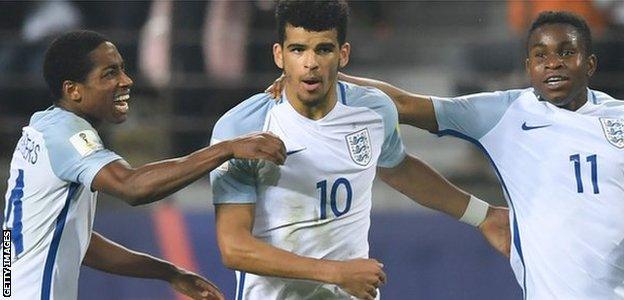
Liverpool striker Dominic Solanke was awarded the Golden Ball given to the player of the tournament
"The money that is available to clubs is brilliant for our game, and we will not complain about that. But it also means there is more money to bring foreign players in.
"What we have to do is keep working with our English players and try and get them to a level where clubs can trust them to go in and play. This tournament has really put players on the map."
With Tottenham's core of English youngsters proof of what is possible, the Premier League is encouraged that last season there was a 20% increase in the number of minutes (716) played by home-grown debutants.
But the danger for the FA is that players who struggle to get first-team football - and remain uncapped in a competitive fixture at senior England level - could be tempted to switch allegiance.
Six of the U20 squad qualify to play for Nigeria for instance, and with the FA having recently seen Wilfried Zaha and Alex Iwobi play for England's youth teams - but then slip through their fingers (to Ivory Coast and Nigeria respectively), Simpson admits it is a worry.
"It is the reality of it, and we always share a concern about that. If we do things properly, if we have the right facilities and treat the players properly then we have a feeling they will want to come back," he said.
"There will be the odd case like Wilfried where we will lose them, but we have to do everything we can and make an effort to build relations with the clubs and the positive relationship with the players so they are happy to come and represent England."
Simpson points out how impressive England's depth of talent is, with the likes of Patrick Roberts, Izzy Brown, Tammy Abraham, Marcus Rashford and Tom Davies all young enough to play at U20 level.
When asked how many of his squad he hopes will go on to play for Gareth Southgate's full senior side, Simpson laughs.
"If I am going to be greedy, I would love to see them all of them do it, but that is living in a bit of a dream world," he said.
"There are no guarantees. But if we can just get a real core of them through. If we can keep them involved in first-team football then the future is really bright. That is what everyone inside the walls at the FA are keeping their fingers crossed for."
With former U21 manager Southgate as England manager, the sense is that players who come through the FA's age-group system will have more chance than ever to break into the senior squad.
Whether they get sufficient opportunities at their clubs remains in doubt. But at least the U20s' exploits in South Korea may have made some managers pause and think whether they really need to look elsewhere.
- Published11 June 2017
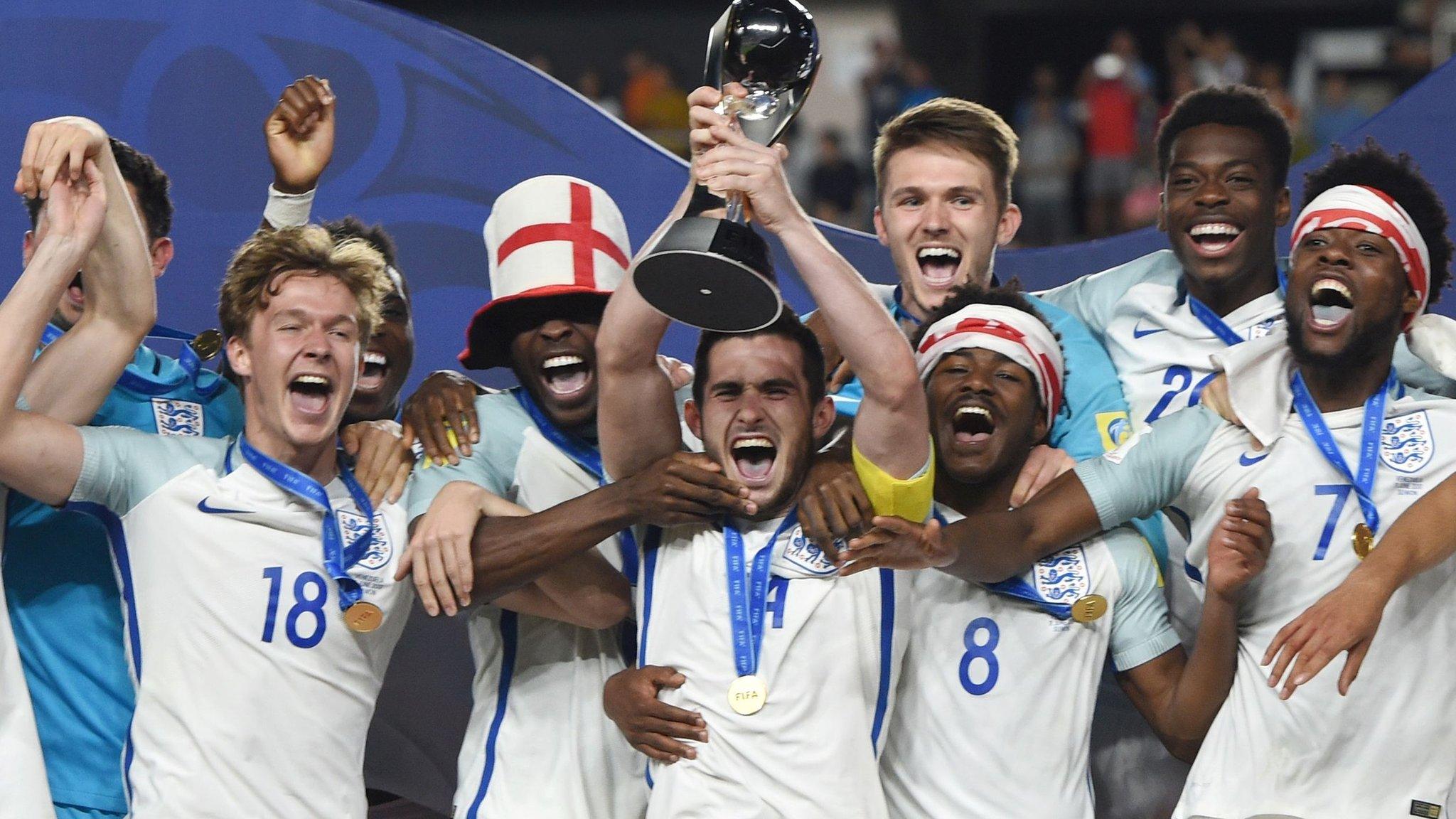
- Published5 June 2017
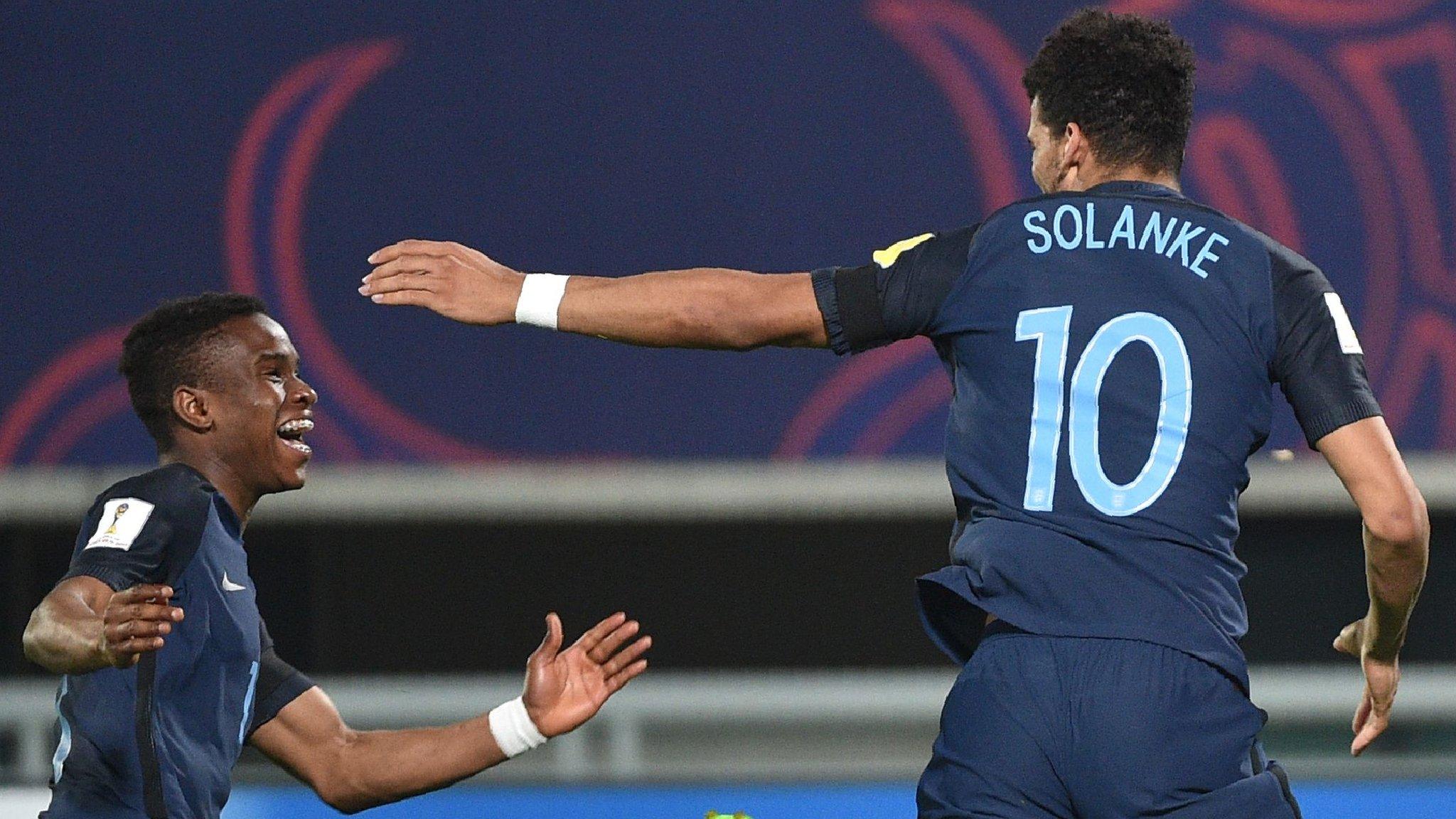
- Published1 June 2017
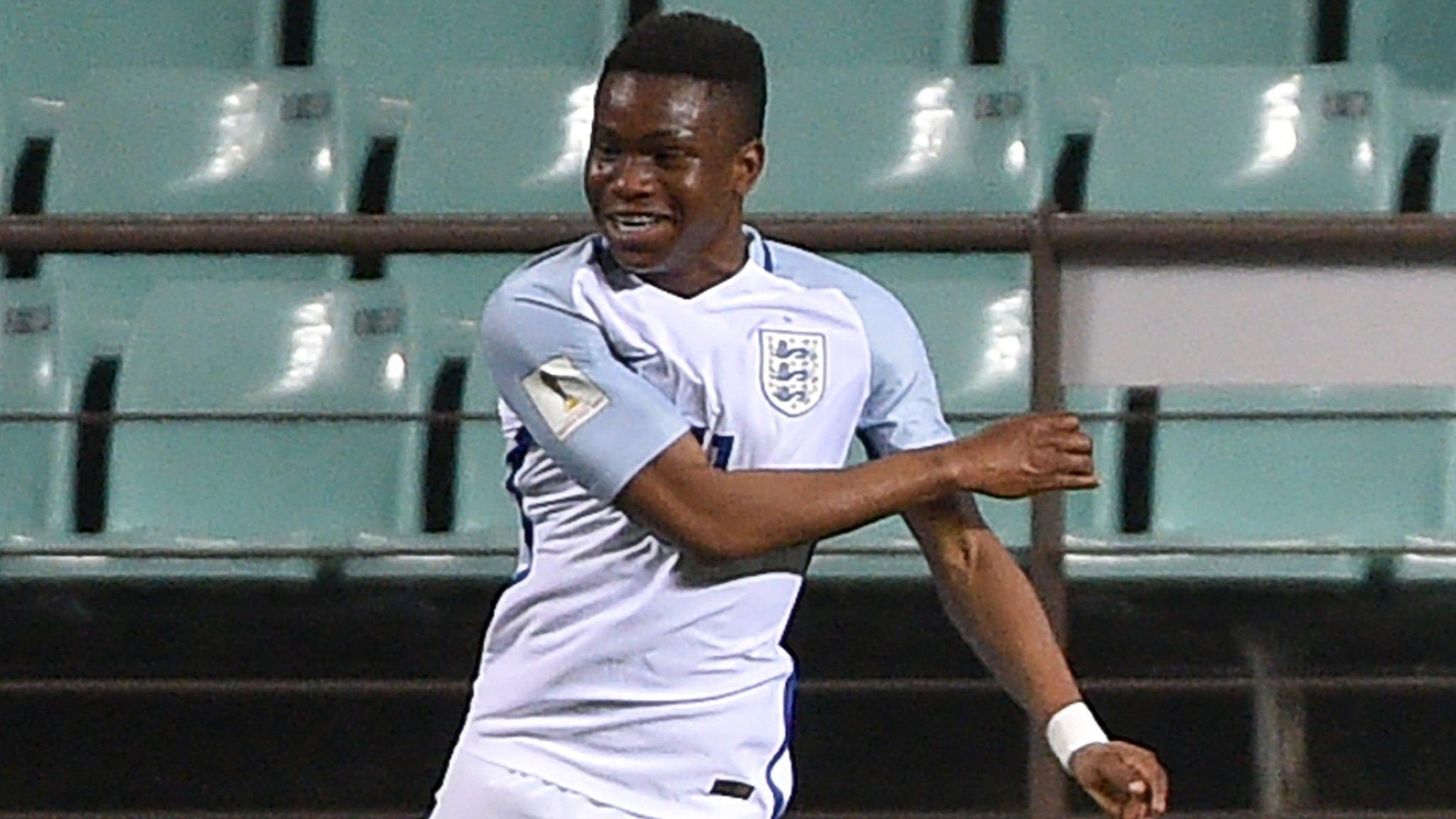
- Published15 May 2016
